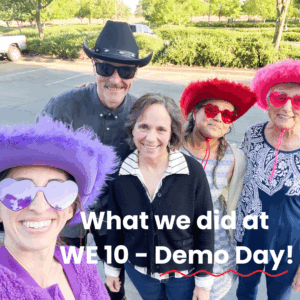To become credentialed as a coach, I went through a fairly intensive program with a great trainer and company, Source Point Training Co. About half way through the program, my mentor/trainer, Barbara Fagan, said to us “It’s time to evaluate your participation.” There was no grading in this program and no discernable measurements being used to evaluate our progress to that point. Rather, we received great training, both in the room and on group phone calls; we practiced our new skills in the training room and with intern clients. And most valuable to me, we received feedback. Professional coaches listened to our coaching calls and offered us real time questions and thoughts on the development of our skill set.
And so when she invited us to evaluate our participation, we were a little surprised. How do we do that?
She said, “it is one thing to say, ‘I am doing well,’ or ‘I am doing poorly,’ but can you back that up with evidence?” And so she broke it down very specifically. On a scale of 1 to 5,
How often are you on time to class?
How often do you do the homework?
How much effort do you put into the homework?
How much do you participate in class?
- How well do you learn based on feedback?
- How well do you support your fellow students in learning?
And then she asked us to total our scores. Scores of 6 – 24, she called “playing not to lose” and 25-30, she called, “playing to win.”
These two concepts have always stuck with me. First, is to evaluate ourselves very specifically. Rather than saying, “I am doing a good job or a bad job,” to actually look at all the evidence – hard facts – to evaluate the way in which we are showing up.
And second, are we playing not to lose or are we playing to win? This changed my mindset in many areas of my life. Where are the places I am playing not to lose? Often it is when I am playing a game that I do not think is mine. Playing not to lose is in many ways just doing the bare minimum to get by. It can be useful to know this. Once we know we are not fully committed to something, which we learn by examining our behavior (the facts), this can help us to see if we even want to be doing it in the first place.
Places I play to win? These are where my passion is, where I am committed, where I am playing a game I have ownership for.
Of course, there might be another option if I see I am playing not to lose and that would be to change the way I am relating to the game and decide to play full out. Decide to play to win. Because playing not to lose is not a useful or fulfilling way to live one’s life.
So check and see:
- What games are you playing (parenthood, your job, your health)?
- Look at specific evidence
- What does the evidence say – are you playing not to lose or are you playing to win?
- If you are playing not to lose, is this even a game you want to stay involved in? And if it is, will you choose to go all in? You may be surprised what happens when all your games are games you play to win.






